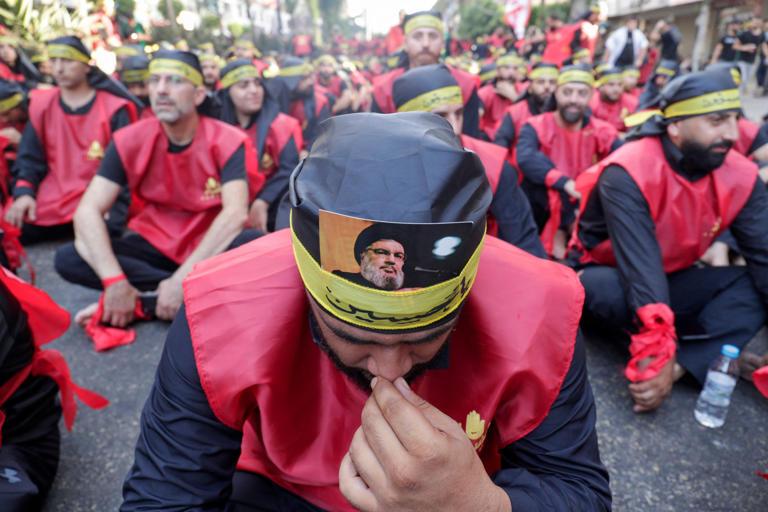
Why Doesn’t the EU Call Hezbollah a Terror Group?
During a debate on the crisis situation in Lebanon last month, the European Parliament, for the first time, adopted a resolution calling for the European Union to add the whole of Hezbollah to its list of banned terrorist organizations.
This welcome call came almost 10 years to the day after the EU added Hezbollah’s so-called “military wing” to its terror list. That came in the wake of the group’s 2012 suicide bus bombing in Burgas, Bulgaria, which killed five Israeli tourists and a Bulgarian driver.
In the period since, several European countries, including Germany, the United Kingdom, the Czech Republic, Austria, among others, have taken the principled decision to ban Hezbollah in its entirety. The Arab League and Gulf Cooperation Council have done the same. The United States has also proscribed Hezbollah in full, and a recent bipartisan resolution reiterated a long-standing call on the EU to designate the whole group as a terrorist organization.
So, why does the EU still maintain an artificial distinction between Hezbollah’s so-called “military” and “political” wings, allowing the group to continue operating virtually unfettered across Europe?
In case one needs a refresher, Hezbollah is a Lebanese-based jihadist terrorist organization, funded, armed, and serving entirely at the best of the Islamic Republic of Iran, which provides the group with some $700 million per year in funding.
Hezbollah’s primary goal is not only the elimination of the State of Israel, but of Jews worldwide. Only a few days ago, Hezbollah Secretary-General Hassan Nasrallah reiterated that the entire Middle East will not rest until the “cancerous gland” that is Israel is removed.
However, Hezbollah is not only a direct threat to Israel, but also a very real threat to the EU as well. There is a long history of terror and terror-related activities carried out against European targets. In addition to the Burgas bus bombing, in recent years, Hezbollah has carried out operations in Greece, Cyprus, Belgium, France, Italy, and Germany.
To help underwrite their terrorist activities, Hezbollah operates an extensive global narco-terrorism network, spanning from Latin American to Europe. According to Europol’s June 2022 European Union Terrorism Situation and Trend Report, “Hezbollah has been using the EU as a base for fundraising, recruitment and criminal activities from which they obtain significant profits.”
Hezbollah is now sending fighters to support Russia, in its relentless war of aggression against Ukraine, and since the conclusion of the 2006 war with Israel, Hezbollah is estimated to have amassed more than 150,000 mostly Iranian-made rockets, aimed at the heart of the Jewish state, in flagrant violation of UN Security Council Resolution 1701.
In addition, Hezbollah has also become a major backer of the Assad regime in Syria, where they have sent fighters and have used as a base to receive weapons from the IRGC in Iran, contrary to UN and EU policy and regulations. In this regard, it should also be noteworthy, that last month’s European Parliament resolution that called to designate Hezbollah in full as a terrorist entity, also called to add the Iranian Revolutionary Guard Corps to its list of banned terrorist organizations.
In its 2019 decision to add Hezbollah’s “political wing” to its list of proscribed terrorist organizations, Britain’s Home Secretary Sajid Javid said the UK came to a realization that “we are no longer able to distinguish between their already banned military wing and the political party.”
As far back as 2004, when Netherlands became the first country in Europe to designate Hezbollah as a terrorist group in its entirety, Dutch intelligence determined that “Hezbollah’s political and terrorist wings are controlled by one coordinating council,” and “this means that there is indeed a link between these parts of the organization.”
In case Brussels has any doubts, they need only listen to Hezbollah leadership itself, with Naim Qassem, Hezbollah’s deputy leader, reaffirming “Hezbollah has a single leadership,” reinforcing that “the same leadership that directs the parliamentary and government work also leads jihad actions in the struggle against Israel.”
The EU’s intransigent refusal to designate Hezbollah a terrorist organization in full essentially boils down to the preposterous argument that doing so would somehow destabilize the domestic situation within Lebanon. France is leading this position because of its historical connection to the country.
But here is a newsflash: Lebanon is already an economic basket case, where the majority of people live in abject poverty, in large part due to the rampant corruption and the omnipresence of Hezbollah, which is effectively running a parallel state within a state.
According to a June 2023 report by the International Monetary Fund, in the four years since the beginning of the economic meltdown, the Lebanese economy has contracted by about 40 percent, the lira has lost 98 percent of its value and inflation has been in triple digits. Meanwhile, Hezbollah continues to profit from Lebanon’s financial crisis making it, according to Forbes, the richest terror organization in the world, amassing a fortune of more than $1 billion.
In short, the EU’s ongoing refusal has only further emboldened Hezbollah, providing the whole group legitimacy, while giving Iran a stronger foothold in Europe. Hezbollah is a genocidal terrorist group, not a rational actor that has Lebanon’s best interests at heart. It is not only naïve, but foolish and reckless to believe they can be reasoned with.
It is long past time the EU designates the entire group as a terrorist organization. Doing so will make Europe, Lebanon, and the Middle East safer, plus deliver a major blow against Iran’s malign influence in the region and Europe.
Source: msn





